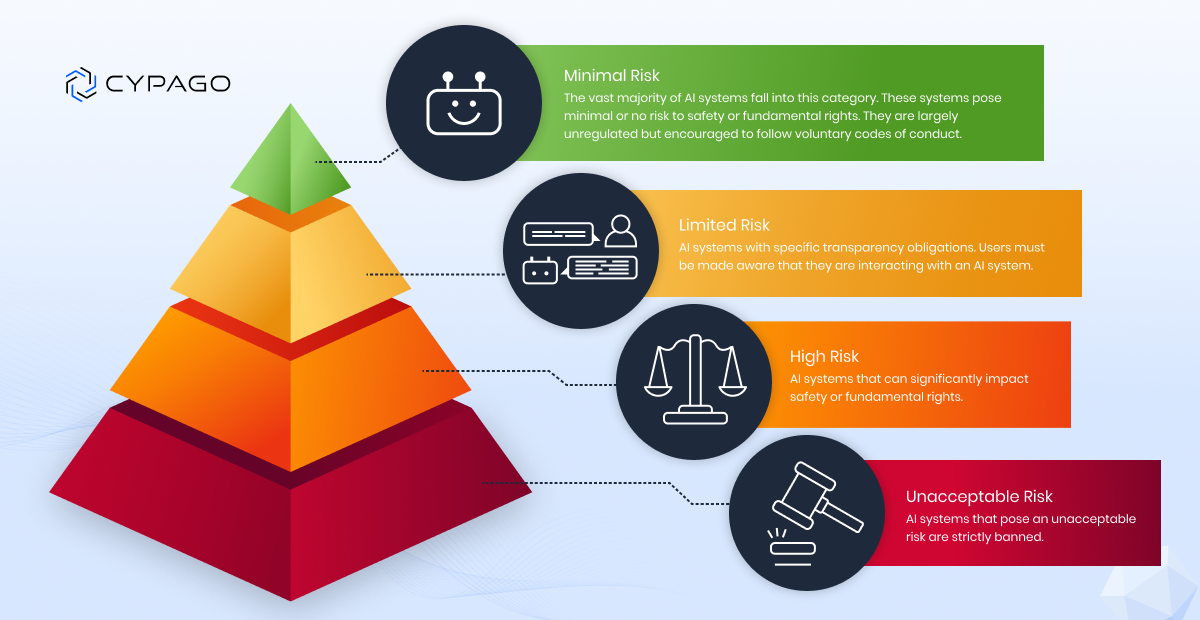The European Union’s AI Act is poised to be one of the most comprehensive regulatory frameworks for artificial intelligence (AI) globally. Its primary aim is to ensure that AI systems deployed within the EU meet stringent safety, transparency, and accountability standards. With AI becoming more integral to business operations, understanding the EU AI Act and its requirements is critical for organizations looking to maintain compliance.
What is the EU AI Act?
The EU AI Act categorizes AI systems based on the risks they pose to individuals and society, dividing them into four categories:
1. Unacceptable Risk: These are AI systems considered a severe threat to fundamental rights and safety, such as AI used for social scoring by governments. These systems are outright banned.
2. High Risk: This category includes AI used in critical infrastructure, education, employment, law enforcement, and other sensitive areas. These systems are subject to strict requirements, including risk management, data governance, transparency, and oversight. Companies deploying high-risk AI must implement robust controls to ensure the system’s ethical use, including comprehensive documentation and regular auditing.
3. Limited Risk: AI systems under this category, such as chatbots, require transparency measures. Users must be informed that they are interacting with AI.
4. Minimal Risk: Systems that pose little to no risk, such as AI used for entertainment, are not subject to significant regulations under the Act.

What Companies Need to Do
For companies operating within the EU or offering AI-based products and services, the EU AI Act brings several compliance challenges. The Act mandates that organizations must:
- Conduct Risk Assessments: Companies need to evaluate the risk their AI systems pose to society. High-risk AI systems must undergo rigorous assessment before deployment.
- Ensure Transparency: For AI systems interacting with humans or processing sensitive data, transparency is critical. Organizations must provide clear documentation explaining how the AI system works and its impact on decision-making processes.
- Implement Data Governance: Proper data management and protection are essential, especially when AI systems handle personal data. Companies must comply with existing data protection laws like the GDPR.
- Monitor and Audit AI Systems: Continuous monitoring of AI systems is required to ensure they operate within acceptable risk levels. Regular auditing is necessary to verify compliance with ethical and regulatory standards.
- Adapt Governance Frameworks: Companies must integrate AI governance into their existing risk management and compliance structures to remain agile as AI regulations evolve.
Why Compliance Matters
Failure to comply with the EU AI Act could result in severe penalties, including fines of up to 6% of a company’s annual global turnover. Additionally, the Act’s focus on transparency and ethical AI aims to build public trust, meaning that compliance not only avoids legal risks but can also enhance brand reputation.
How Cypago Simplifies EU AI Act Compliance
As companies grapple with the complexities of AI governance, solutions that offer automation, continuous monitoring, and risk management become indispensable. Cypago’s Cyber GRC Automation (CGA) platform is designed to support businesses in achieving and maintaining compliance with the EU AI Act and other emerging AI regulations.
Cypago’s platform integrates the latest AI governance frameworks, including the NIST AI Risk Management Framework (RMF) and ISO 420001, which align closely with the requirements of the EU AI Act. By leveraging these frameworks, Cypago helps organizations streamline their compliance efforts by automating risk assessments, compliance gap detection, and ongoing monitoring of AI systems.
Key Features of Cypago for EU AI Act Compliance
- Automated Compliance Monitoring: Cypago provides real-time visibility into AI tools and models, ensuring that businesses can continuously monitor compliance without manual intervention.
- Risk Management: With built-in AI governance and risk management capabilities, the platform helps identify and mitigate potential risks before they escalate into regulatory violations.
- AI Security Governance: Cypago’s heightened security features protect AI systems from evolving cyber threats and data breaches, which are critical for maintaining compliance with the EU AI Act’s data governance requirements.
- Comprehensive Auditing Tools: The platform offers detailed audit trails and documentation, ensuring that companies can easily demonstrate compliance to regulatory authorities.
By adopting Cypago, companies can confidently navigate the evolving AI regulatory landscape, including the stringent demands of the EU AI Act, while ensuring the safe and compliant use of AI technologies.
Looking Ahead
The EU AI Act represents a significant shift in how businesses must approach the deployment of AI systems. With the regulation set to impact a wide range of industries, companies need to act now to align their AI governance strategies with the Act’s requirements. Cypago’s automated solutions provide the tools necessary to achieve compliance with the EU AI Act, enabling businesses to leverage the power of AI while safeguarding against regulatory risks.
